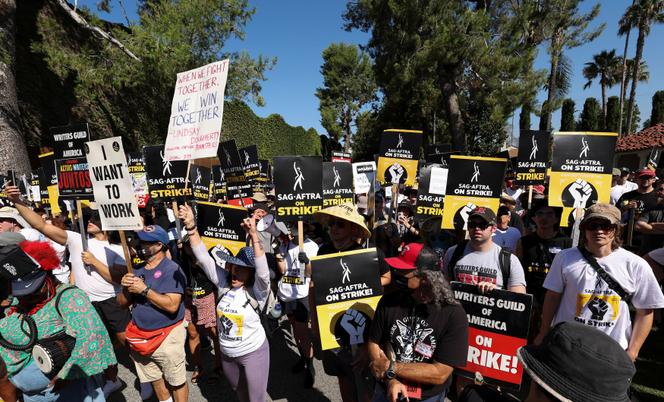


Jude Law canceled, Natalie Portman canceled, Julianne Moore canceled. The Deauville American Film Festival, which opens on Friday, September 1, will have to make do without the Hollywood stars who, beyond their films, have made its reputation since 1975. By joining the writers' strike at the beginning of the summer, the powerful Screen Actors Guild (SAG) has deprived cinema of its glitterati. But that's not all.
"It's not just that. This strike is disrupting the entire release schedule," lamented French distributor and producer Michèle Halberstadt. "It comes at the worst possible time, just as we've recovered from the pandemic-related shutdown." What will the film industry's economy look like in 2024 if American blockbusters fail to turn up? It would be an economic crisis, but also a political and societal one.
It all began four months ago. With no agreement found between the studios and streaming platforms, the 11,500 scriptwriters in the Writers Guild of America (WGA) went on strike. They are demanding three things: Firstly, guaranteed salaries, at a time when studios are increasingly cutting back on the amount they spend on writing, particularly for series, which is a classic example. Secondly, an overhaul of residual rights (broadcasting rights) made null and void by platforms that don't communicate their consultation figures, which is more complicated. And, thirdly, regulation in the face of the threats posed by artificial intelligence. AI is seen less and less as a tool, and more and more as a competitor. That is where things get tricky.
"It's a strike about a technological paradigm shift that reminds me of the one that took place in 1960, when television first appeared," said Xavier Lardoux, long-time film and audiovisual director at France's National Center of Cinematography and the Moving Image (CNC). The combined movement by actors and writers that brought Hollywood to a standstill for the first time (with Ronald Reagan as chief negotiator) came at the close of a decade when television sets had flooded the market. America no longer needed to go to the movies to see movies. The result was the Residual Rights Agreement, which the opacity of platforms is now shattering. This current situation comes after a decade in which the rise of streaming and the GAFAMs (Google, Apple, Facebook, Amazon, Microsoft) has reshuffled both the industry and how power is distributed. The arrival of ChatGPT has made clear to the average citizen the obvious fact that the algorithm, this friend who wishes us well, has sounded the death knell for delicately balanced situations that have been in place for a long time.
You have 69.69% of this article left to read. The rest is for subscribers only.
